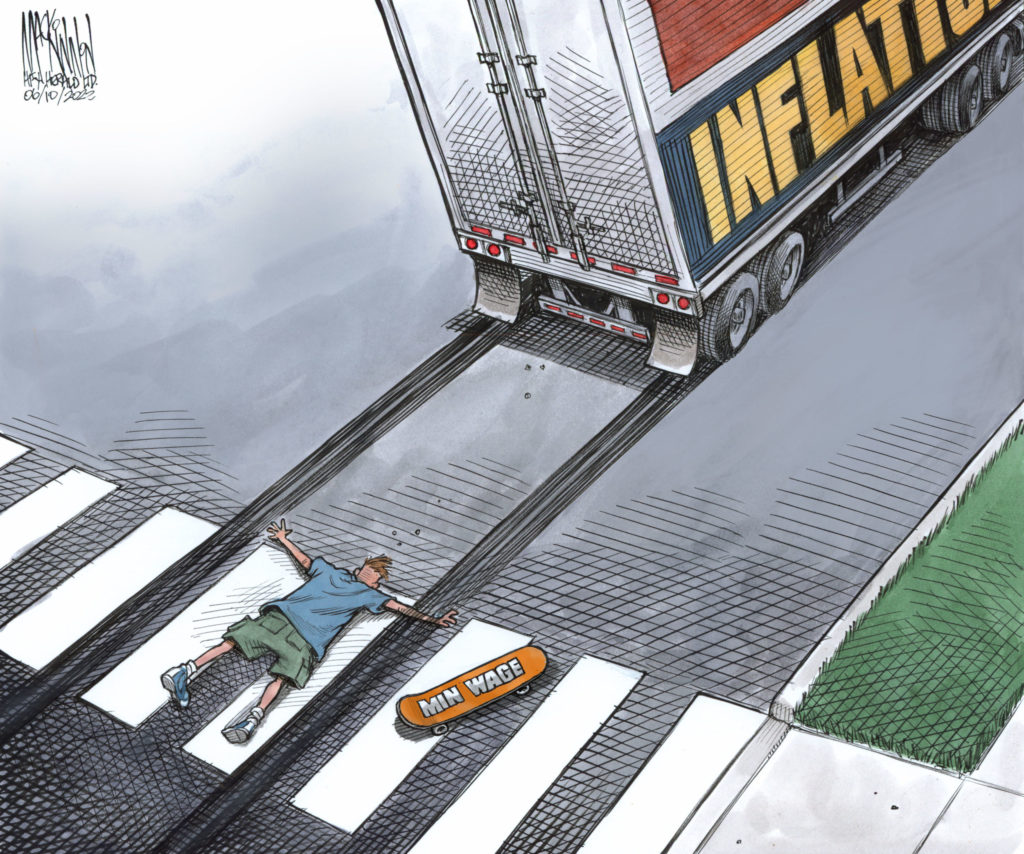
Colette Murphy is the Chief Executive Officer of the Atkinson Foundation.
The exorbitant price we pay for inequality is rising faster than the current rate of inflation these days. When I first heard the logic of inflation many years ago, it sounded like a naturally occurring phenomenon like gravity and tides. I soon discovered that the cost of essential goods and services, and the cost of borrowing money, are determined by powerful economic players — not some “invisible hand” that pulls the levers of the economy and chooses who wins or loses.
I’ll never understand why anyone would choose an economic system in which the pain of price hikes and high interest rates trickles down to workers who earn only a minimum wage. All the while, excessive corporate profits pile up. It doesn’t have to be this way. We can make better choices.
In an incisive article for the Canadian Centre for Policy Alternatives, Alex Himelfarb reminds us that “we haven’t always hated inflation or called for such harsh medicine to cure it.” He tells us that “historian Rebecca Spang traces how concern about inflation rather than the more serious deflation and depression took centre stage when we began to think of ourselves less as producers and more as consumers, an outlook she says hardened in the 1970s. Inflation, in other words, is not just one thing once and for all … The story of inflation is a story of shifting priorities, of winners and losers, of power.”
At a time when prices are increasing twice as fast as wages, the story can no longer be about shrinking governments, austerity measures and labour cuts. That familiar plot ends with everyone worse off. Our story must start with the people who benefit the most, paying the most to make our economy work for everyone. What workers need are basic public services like child care and transit to reduce the pressure on household budgets. They need an immediate and significant increase in minimum wage to prevent a permanent reduction in living standards. They also need to join their voices with many, many others to generate the democratic power that makes this new story and so much more possible.
Atkinson is part of a growing movement fighting for the people who are hurt most by inflation, and for our common future. That includes advocating for rules that cause less harm and produce material benefits for them. But it also includes challenging the idea that the structure of our economy can’t change, with the irrefutable evidence that the planet won’t survive if it doesn’t.
Here’s what Atkinson is choosing to do about inflation right now:
- Providing an 8% inflation top up to 2022 grant payments. Invariably, charitable and nonprofit organizations experience a spike in community needs and a loss of capacity to meet them when inflation rises rapidly. Provisions for inflation are usually made at the start of an agreement, but the current situation necessitates a significant increase before the end of the year.
- Advocating alongside partners and many others for specific public policies and corporate policy change.
- Decent wages and working conditions. An increase of the minimum wage to $20, ten paid sick days, permanent status for migrant workers, and other labour protections that contain the damage caused by the worst economic conditions and take on the inequities built into the structure of our economy.
- Income supports. Immediate financial assistance for workers struggling to make ends meet, improved inflation-adjusted income support programs, tax credits and other measures.
- Basic public programs and services. Long-term care, child care, pharmacare, dental care among others.
- Shareholder action. Investments in companies that can demonstrate a commitment to decent work, and submitting proposals to change inequitable practices.
Understanding inflation is always challenging but nearly impossible at a time of multiple global crises. We count on the Atkinson Fellow on the Future of Workers’, economist Armine Yalnizyan, to cut through the jargon to pragmatic solutions. This recent CBC interview provides a helpful perspective.
In Armine’s most recent column for the Toronto Star, she writes about the price we’ll pay to heat our homes this winter. She says that a million or more Canadian households are on the brink of “energy poverty” with a “cold choice could be between heating and eating.”
Surely we can agree that no one should ever be expected to make this choice or pay this price.
Editorial cartoon by Bruce MacKinnon | SaltWire Network. Originally published in June 2022. Used with permission.
